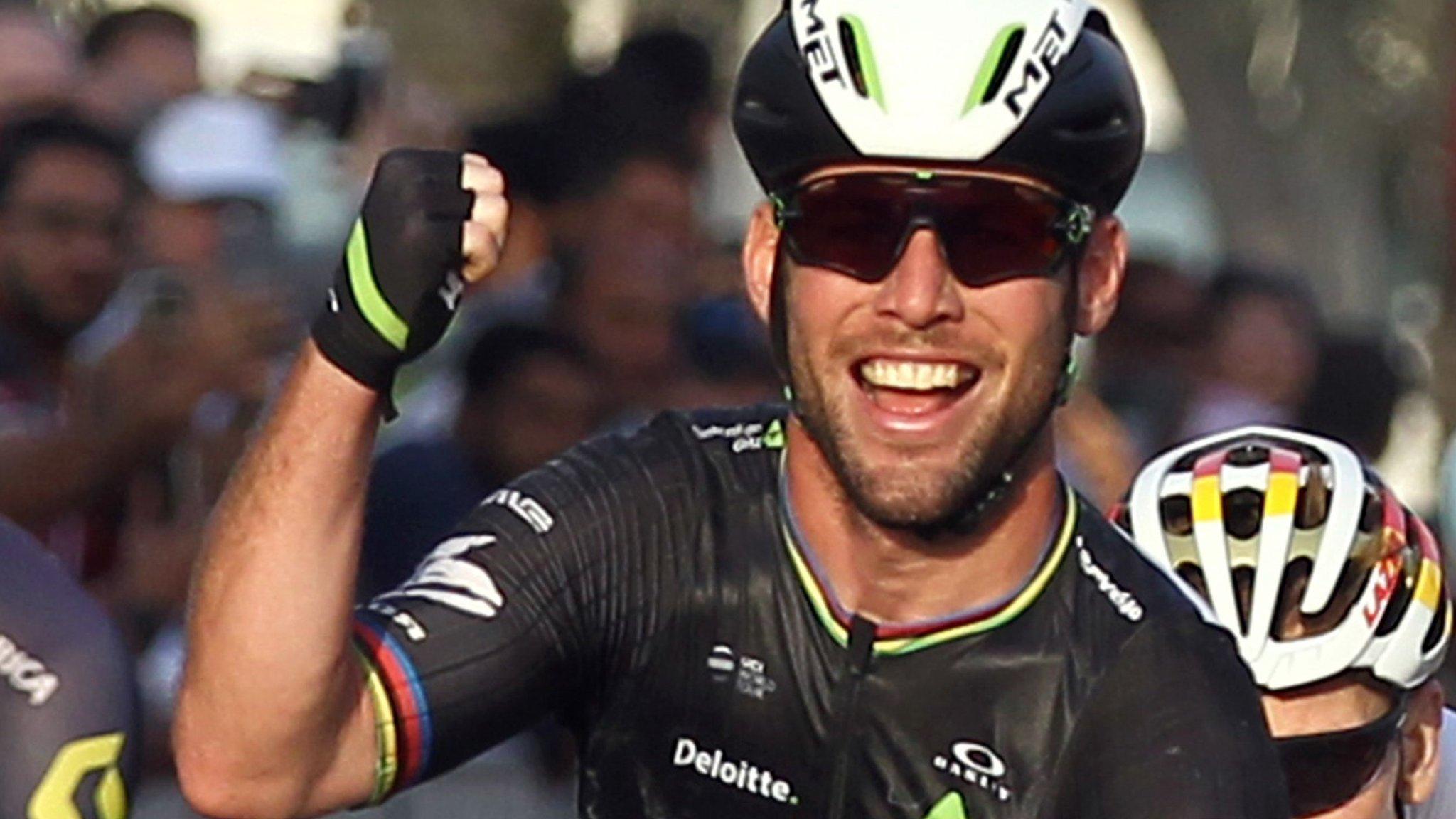Chris Froome: Tour de France & the secret world of climbing
- Published
- comments
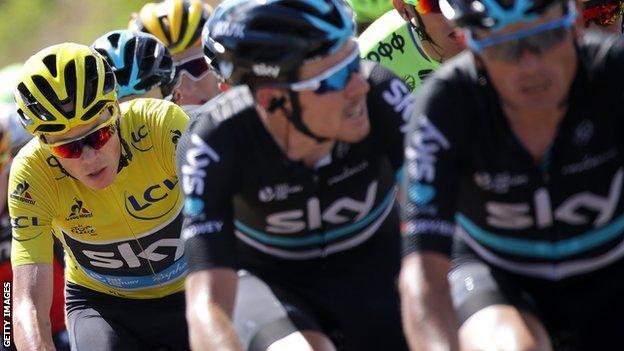
"If you can see someone battling and they're a threat to your position, you're going to twist that knife as hard as you can."
The first thing you notice when you shake Chris Froome's hand is how lean he is: big eyes, thin cheekbones, black t-shirt and shorts hanging off him as if they are two sizes too big.
We are in Monaco, with the Tour de France imminent. Not to gawp at the prominent bones in his arms and wrists, although you can't miss them, and not to make small-talk, although he is as polite as a maitre d' and will thank you for coming before you've had a chance to thank him for being there.
As he prepares to take aim at his fourth yellow jersey in five years, we have instead come to talk about where those first titles were won and where the next might again be decided: the high mountains, the summit finishes, the places where the road points towards the heavens and the riders slip into their own personal hell.
Mountains bring the biggest crowds and the greatest dramas, the decisive time differences and the killer moves. Mountains bring pain, and suffering, and broken characters and mangled dreams.
This is the secret world of climbing, and nothing about it is easy.
The climb comes into view
Archive: Chris Froome the making of a GB cycling legend
Hundreds of miles under their wheels, a hundred more on that day alone. When the peloton approaches the crescendo to a mountain stage, it first fractures and then blows apart.
"There is a tension in the air," says Froome. "You know this is a day when you will be crawling back to the team bus when the stage finishes.
"At the bottom of the decisive climb, the jostling for position is like a bunch sprint in itself. You're going full gas. You know that if you back off the wheel in front even a few feet, that's enough for someone to cut in and take your place. Everyone is on the limit.
"You get people who are up there for no apparent reason, who want to ride halfway up your lead-out train. And you have to fight them off. You have to get them out of there, because they're the guys who are going to take you back with them. "
The crowds close in
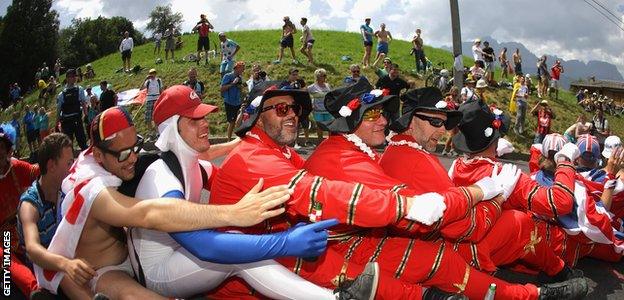
An 'oops upside your head' moment for fans during stage 18
The spectators have been up there for hours, for days in advance. There are motorhomes squeezed onto any flat ground, empty wine bottles and cans of beer in the verges, men stripped to the waist running up and down the road. You hope the vast crowds will continue to part miraculously in front of you like the Red Sea. You hope.
"If you're going up l'Alpe D'Huez and it's 10 people deep on either side, it's just a wall of noise," says Froome. "You can't hear anything.
"There are people lighting fireworks, people lighting flares right next to us, and you just block it all out for everything that is happening on the bike.

Outlandish fancy dress is guaranteed to get you noticed
"You can smell the beer, you can smell the barbecues. Up on the mountain, especially in the afternoon, you get really close to people, and you can smell the alcohol. It's a heavy smell.
"It does get scary. But when you have someone shouting at you, 'Dig in, dig in!' - it's an amazing feeling. You're hurting, struggling to hold the pace, and you're thinking, bloody hell, he's right - I just need to get through this little bit…"
The suffering begins
The broad bunch of riders thins out and separates. The team-mates of the big stars go to the front to protect and assist their star men. Heart-rates climb and legs start to burn.
"The pain creeps up on you. When you're excited at the bottom, everything feels fresh. You're able to respond to small accelerations. You can close the gap to the wheel in front. As you climb, the freshness goes.
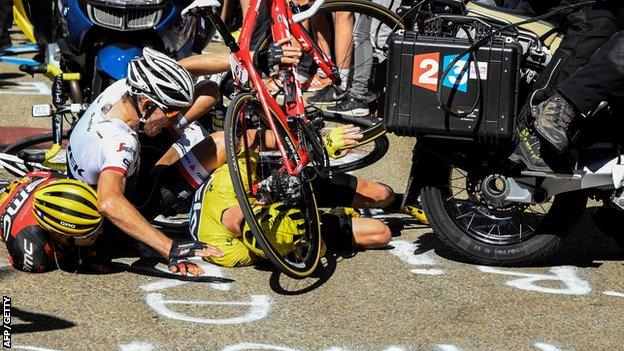
Chris Froome (right), Bauke Mollema (centre) and Richie Porte were left in a heap by a collision with a motorbike in 2016
"Slowly one muscle group will turn to cement. It's in overdrive. Other muscles try to compensate, and then they start shutting down. Muscle by muscle it gets worse as the pain sets in. You start feeling it in the back, in the shoulders.
"It's different to the pain of a bunch sprint, which is short and explosive. You don't have time to think about the pain. In a time-trial it's just you out there on the road. No-one to talk to, just your body and its feelings.
"Your body is saying, this hurts, that hurts, slow down - and you just have to go faster. I've always loved that feeling of my body being on the limit. Feeling empty, having no more to give but still pushing your body. I enjoy that, in a sick way."
Playing poker on wheels
This is not just about strength. This is not just about your power output, or how many frivolous grams of bodyweight you managed to drop in the last few weeks before racing. There are games within games, sub-plots that could yet decide the greater story arc.
"When you're still 10km out from the summit, you don't want to be the guy on the front doing all the pulling. You almost need to play a game: 'I can only do 30 seconds on the front here, then it's up to you guys.'
"And you're pretending. Because you know that in the final two kilometres you're going to have to give everything you have.
"You will bluff. You will hang a few metres off the next wheel, try to get that guy to think, 'Maybe he's not having a good day today, now's the time to push…' And then they will go too deep, thinking they can drop you.
"I've been fooled sometimes. It's a constant game between you and your rivals, where you are at, how you can play on each other's insecurities."
The hidden signs slip out
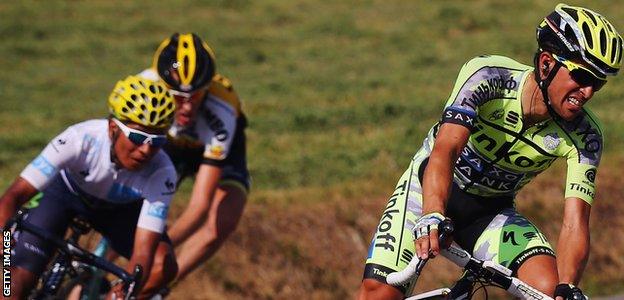
Catch it if you can: Is this the famous Alberto Contador grimace?
Some are better poker players than others. Some can read their opponents even while keeping their own intentions tucked away.
"Alberto Contador - if you can catch it - he has a little grimace he gives, that almost looks like a smile, but it's a grimace, when he's on the limit. Only for a split second.
"He only does it for an instant, like he's taking a breath, and you can see it - ah, he's there, right on his threshold.
"My tell is that I drop my head. But I ride with my head dropped most of the time. My own team-mates, my own wife can't tell if I'm on a good day or bad day."
The cruelty of the climb
Away goes a final group - team-mates, super-domestiques all spent and spat out the back. Now it is down to the big boys, the general classification contenders, out there alone on the steep, sun-baked tarmac, all together, all trying to break the others apart.
"It's a really strange place to be. You're all suffering. There's no-one who is easy on those climbs.
"But it depends on the degree of suffering, and how much everyone is prepared to suffer. If you're suffering but you can see someone else suffering more, you'll probably go on and push it even harder. Which just sounds mental, but you know that's going to be the difference between being in front and being behind at the end of the day.
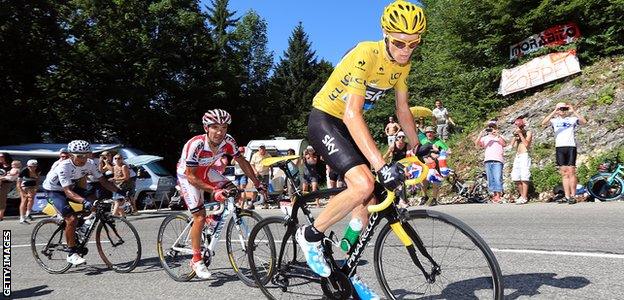
With Nairo Quintana (back) and Joaquin Rodriguez (centre) for company during the final climb of stage 20 in 2013
"That's what it comes down to. You want to twist the knife. If you can see someone battling, and they're a threat to your position, you're going to twist that knife as much as you can.
"You can see it. It's like a switch that has been flicked. When someone pops that switch, when you can see that in their head it's a case of this is too much, I cannot carry on at this speed - it's a switch that you flick, and you can see it.
"In effect you've broken their character. It's primeval. It's rewarding. And it's a great feeling when you can inflict that on someone else, and a horrible feeling when someone's doing it to you."
The darkest moments
Four kilometres to go. So much riding done, so many critical pedal strokes still to come. Everything hurts. Nothing comes easy. Why not stop? Why not ease up, just for a few beautiful seconds?
"There are times you do doubt yourself. You think you're on a good day, and then someone just accelerates that little bit too fast out of a corner, and you think, oof, he's looking fresher than I feel. And you doubt yourself.
"So much of the time it's a game of confidence, it's a game of how much you believe in what you are able to do, compared to the guy next to you. And always trying to judge that balance between who can go faster, and therefore should I be upping the pace, should I be hanging off trying to get them to slow down?
"There are a lot of things that go through your mind in those moments. You think about your rivals, how much you've anticipated this moment, how you've visualised how it's going to pan out.
"You think about your loved ones. I think about my family. I'm laying it all on the line for them."
The exposure of the end game
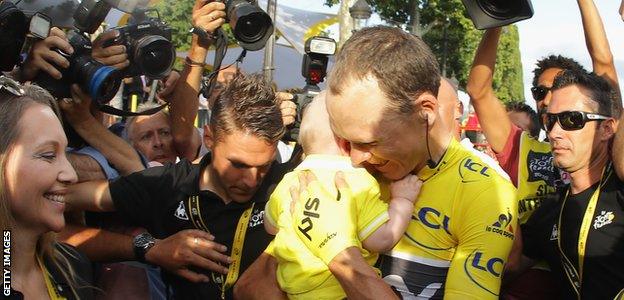
Froome celebrates with his family after winning back-to-back Tour de France titles
Helicopters overhead, cameramen on motorbikes in front of you, team car behind. Thousands screaming at you roadside, millions more watching on television. And yet you are alone. You, your heart, your legs, your lungs.
"There is no hiding when you get up into those high mountains. If you haven't done the work, it's really going to show.
"You can't hide in the bunch, you can't rely on your team-mates to protect you and shield you. It's man against man, and if you haven't got it, you haven't got it.
"I love it. I love that excitement, I love the anticipation. It's a lot of hard work and sacrifice that goes into being ready for a big mountain stage in the Tour, and when it all comes together, there's no better feeling.
"That's what brings me back every year to the Tour, and makes it my number one priority - just how rewarding it is to have that feeling. Of being able to inflict that upon your rivals."
From red zone to yellow jersey
Under the flame rouge. A glance back past your own armpit at the road behind you. No-one. Working it hard to the finish line, zipping up a jersey sodden with sweat, raising one weary arm for the cameras.
"There's already a release of really good positive feelings and energy once you manage to drop your rivals," says Froome. "That for me is one of the best, best feelings ever.
"And then when you get close to the finish line and the suffering can finally end, and you can finally switch off and let the body recover, it's just a huge feeling of release and relaxation from the effort you've just buried yourself to do.
"Only when you get back to the hotel, and you lie down about nine or 10 o'clock, that's the first time you switch off from everything, when you start feeling the compound effect of three weeks' racing, when you feel how tough the Tour is.
"I've had days when you finish off with your massage or physio, and normally you have to go down a couple of flights of stairs and out the front of the hotel to the kitchen truck for dinner. And some days you think, I could just go to bed now. I can't be bothered even walking to get food.
"The bad days are the ones you have your shower sitting down. For me that's a measure of just how hard the day has been.
"Sometimes you get in the shower, and you literally feel as if you don't have the energy to stand there. So for me I sit down on the floor and start soaping myself there. It feels like I'm giving myself a break. That's how gone you are."
- Published29 June 2017
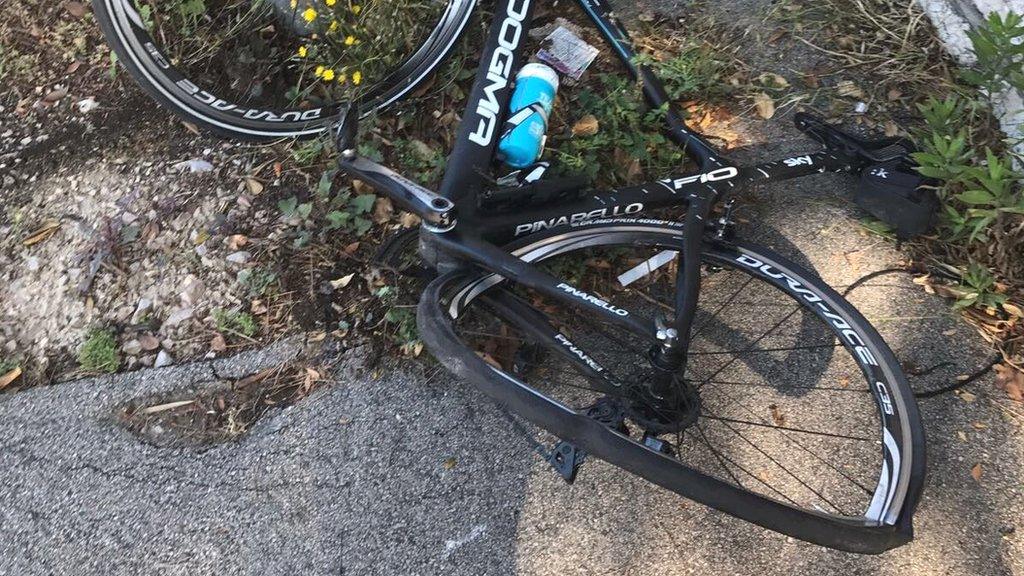
- Published27 June 2017
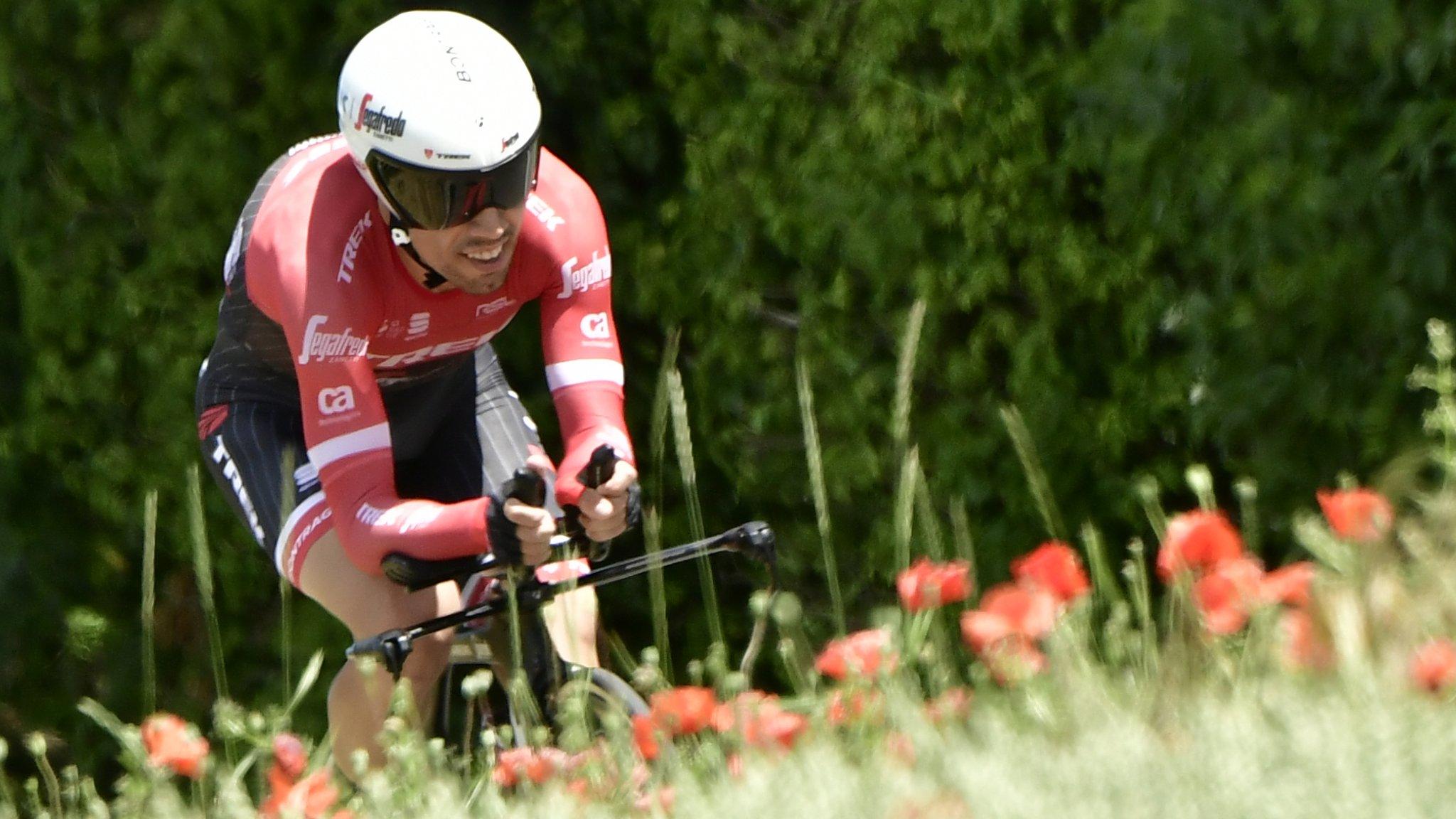
- Published26 June 2017
